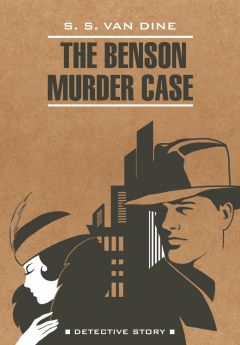
Автор книги: Стивен Ван Дайн
Жанр: Иностранные языки, Наука и Образование
Возрастные ограничения: +16
сообщить о неприемлемом содержимом
Текущая страница: 14 (всего у книги 18 страниц)
Chapter XX. A Lady Explains
(Wednesday, June 19; 4.30 p.m.)
“The quest for enlightenment upon which we are now embarked,” said Vance, as we rode up town, “may prove a bit tedious. But you must exert your will-power, and bear with me. You can’t imagine what a ticklish task I have on my hands. And it’s not a pleasant one either. I’m a bit too young to be sentimental, and yet, d’ ye know, I’m half inclined to let your culprit go.”
“Would you mind telling me why we are calling on Miss St. Clair?” asked Markham resignedly.
Vance amiably complied.
“Not at all. Indeed, I deem it best for you to know. There are several points connected with the lady that need eluc’dation. First, there are the gloves and the hand-bag. Nor poppy nor mandragora shall ever medicine thee to that sweet sleep which thou ow’dst yesterday until you have learned about those articles—eh, what?—Then, you recall, Miss Hoffman told us that the Major was lending an ear when a certain lady called upon Benson the day he was shot. I suspect that the visitor was Miss St. Clair; and I am rather curious to know what took place in the office that day, and why she came back later. Also, why did she go to Benson’s for tea that afternoon? And what part did the jewels play in the chit-chat?—But there are other items. For example: Why did the Captain take his gun to her? What makes him think she shot Benson?—he really believes it, y’ know. And why did she think that he was guilty from the first?”
Markham looked sceptical.
“You expect her to tell us all this?”
“My hopes run high,” returned Vance. “With her verray parfit gentil knight jailed as a self-confessed murderer, she will have nothing to lose by unburdening her soul. … But we must have no blustering. Your police brand of aggressive cross-examination will, I assure you, have no effect upon the lady.”
“Just how do you propose to elicit your information?”
“With morbidezza[132]132
morbidezza (итал.) —мягкость
[Закрыть], as the painters say. Much more refined and gentlemanly, y’ know.”
Markham considered a moment.
“I think I’ll keep out of it, and leave the Socratic elenchus entirely to you.”
“An extr’ordin’rily brilliant suggestion,” said Vance.
When we arrived Markham announced over the house-telephone that he had come on a vitally important mission; and we were received by Miss St. Clair without a moment’s delay. She was apprehensive, I imagine, concerning the whereabouts of Captain Leacock.
As she sat before us in her little drawing-room overlooking the Hudson, her face was quite pale, and her hands, though tightly clasped, trembled a little. She had lost much of her cold reserve, and there were unmistakable signs of sleepless worry about her eyes.
Vance went directly to the point. His tone was almost flippant in its lightness: it at once relieved the tension of the atmosphere, and gave an air bordering on inconsequentiality to our visit.
“Captain Leacock has, I regret to inform you, very foolishly confessed to the murder of Mr. Benson. But we are not entirely satisfied with his bona fides[133]133
bona fides (лат.) —добросовестность; юридический термин, который означает, что правовое отношение участника судебного процесса правомерно
[Закрыть]. We are, alas! awash between Scylla and Charybdis. We can not decide whether the Captain is a deep-dyed villain or a chevalier sans peur et sans reproche[134]134
chevalier sans peur et sans reproche (фр.) —рыцарь без страха и упрека
[Закрыть]. His story of how he accomplished the dark deed is a bit sketchy: he is vague on certain essential details; and—what’s most confusin’—he turned the lights off in Benson’s hideous living-room by a switch which pos’tively doesn’t exist. Cons’quently, the suspicion has crept into my mind that he has concocted this tale of derring-do in order to shield someone whom he really believes guilty.”
He indicated Markham with a slight movement of the head.
“The District Attorney here does not wholly agree with me. But then, d’ ye see, the legal mind is incredibly rigid and unreceptive once it has been invaded by a notion. You will remember that, because you were with Mr. Alvin Benson on his last evening on earth, and for other reasons equally irrelevant and trivial, Mr. Markham actu’lly concluded that you had had something to do with the gentleman’s death.”
He gave Markham a smile of waggish reproach, and went on:
“Since you, Miss St. Clair, are the only person whom Captain Leacock would shield so heroically, and since I, at least, am convinced of your own innocence, will you not clear up for us a few of those points where your orbit crossed that of Mr. Benson? … Such information cannot do the Captain or yourself any harm, and it very possibly will help to banish from Mr. Markham’s mind his lingering doubts as to the Captain’s innocence.”
Vance’s manner had an assuaging effect upon the woman; but I could see that Markham was boiling inwardly at Vance’s animadversions on him, though he refrained from any interruption.
Miss St. Clair stared steadily at Vance for several minutes.
“I don’t know why I should trust you, or even believe you,” she said evenly; “but now that Captain Leacock has confessed,—I was afraid he was going to, when he last spoke to me,—I see no reason why I should not answer your questions. … Do you truly think he is innocent?”
The question was like an involuntary cry: her pent-up emotion had broken through her carapace of calm.
“I truly do,” Vance avowed soberly. “Mr. Markham will tell you that before we left his office I pleaded with him to release Captain Leacock. It was with the hope that your explanations would convince him of the wisdom of such a course, that I urged him to come here.”
Something in his tone and manner seemed to inspire her confidence.
“What do you wish to ask me?” she asked.
Vance cast another reproachful glance at Markham, who was restraining his outraged feelings only with difficulty; and then turned back to the woman.
“First of all, will you explain how your gloves and hand-bag found their way into Mr. Benson’s house? Their presence there has been preying most distressin’ly on the District Attorney’s mind.”
She turned a direct, frank gaze upon Markham.
“I dined with Mr. Benson at his invitation. Things between us were not pleasant, and when we started for home, my resentment of his attitude increased. At Times Square I ordered the chauffeur to stop—I preferred returning home alone. In my anger and my haste to get away, I must have dropped my gloves and bag. It was not until Mr. Benson had driven off that I realized my loss, and having no money, I walked home. Since my things were found in Mr. Benson’s house, he must have taken them there himself.”
“Such was my own belief,” said Vance. “And—my word!—it’s a deucedly long walk out here, what?”
He turned to Markham with a tantalizing smile.
“Really, y’ know, Miss St. Clair couldn’t have been expected to reach here before one.”
Markham, grim and resolute, made no reply.
“And now,” pursued Vance, “I should love to know under what circumst’nces the invitation to dinner was extended.”
A shadow darkened her face, but her voice remained even.
“I had been losing a lot of money through Mr. Benson’s firm, and suddenly my intuition told me that he was purposely seeing to it that I did lose, and that he could, if he desired, help me to recoup.” She dropped her eyes. “He had been annoying me with his attentions for some time; and I didn’t put any despicable scheme past him. I went to his office, and told him quite plainly what I suspected. He replied that if I’d dine with him that night we could talk it over. I knew what his object was, but I was so desperate I decided to go anyway, hoping I might plead with him.”
“And how did you happen to mention to Mr. Benson the exact time your little dinner party would terminate?”
She looked at Vance in astonishment, but answered unhesitatingly.
“He said something about—making a gay night of it; and then I told him—very emphatically—that if I went I would leave him sharply at midnight, as was my invariable rule on all parties. … You see,” she added, “I study very hard at my singing, and going home at midnight, no matter what the occasion, is one of the sacrifices—or rather, restrictions—I impose on myself.”
“Most commendable and most wise!” commented Vance. “Was this fact generally known among your acquaintances?”
“Oh yes. It even resulted in my being nicknamed Cinderella.”
“Specifically, did Colonel Ostrander and Mr. Pfyfe know it?”
“Yes.”
Vance thought a moment.
“How did you happen to go to tea at Mr. Benson’s home the day of the murder, if you were to dine with him that night?”
A flush stained her cheeks.
“There was nothing wrong in that,” she declared. “Somehow, after I had left Mr. Benson’s office, I revolted against my decision to dine with him, and I went to his house—I had gone back to the office first, but he had left—to make a final appeal, and to beg him to release me from my promise. But he laughed the matter off, and after insisting that I have tea, sent me home in a taxicab to dress for dinner. He called for me about half past seven.”
“And when you pleaded with him to release you from your promise you sought to frighten him by recalling Captain Leacock’s threat; and he said it was only a bluff.”
Again the woman’s astonishment was manifest.
“Yes,” she murmured.
Vance gave her a soothing smile.
“Colonel Ostrander told me he saw you and Mr. Benson at the Marseilles.”
“Yes; and I was terribly ashamed. He knew what Mr. Benson was, and had warned me against him only a few days before.”
“I was under the impression the Colonel and Mr. Benson were good friends.”
“They were—up to a week ago. But the Colonel lost more money than I did in a stock pool which Mr. Benson engineered recently, and he intimated to me very strongly that Mr. Benson had deliberately misadvised us to his own benefit. He didn’t even speak to Mr. Benson that night at the Marseilles.”
“What about these rich and precious stones that accompanied your tea with Mr. Benson?”
“Bribes,” she answered; and her contemptuous smile was a more eloquent condemnation of Benson than if she had resorted to the bitterest castigation. “The gentleman sought to turn my head with them. I was offered a string of pearls to wear to dinner; but I declined them. And I was told that, if I saw things in the right light—or some such charming phrase—I could have jewels just like them for my very, very own—perhaps even those identical ones, on the twenty-first.”
“Of course—the twenty-first,” grinned Vance. “Markham, are you listening? On the twenty-first Leander’s note falls due, and if it’s not paid the jewels are forfeited.”
He addressed himself again to Miss St. Clair.
“Did Mr. Benson have the jewels with him at dinner?”
“Oh, no! I think my refusal of the pearls rather discouraged him.”
Vance paused, looking at her with ingratiating cordiality.
“Tell us now, please, of the gun episode—in your own words, as the lawyers say, hoping to entangle you later.”
But she evidently feared no entanglement.
“The morning after the murder Captain Leacock came here and said he had gone to Mr. Benson’s house about half past twelve with the intention of shooting him. But he had seen Mr. Pfyfe outside and, assuming he was calling, had given up the idea and gone home. I feared that Mr. Pfyfe had seen him, and I told him it would be safer to bring his pistol to me and to say, if questioned, that he’d lost it in France. … You see, I really thought he had shot Mr. Benson and was—well, lying like a gentleman, to spare my feelings. Then, when he took the pistol from me with the purpose of throwing it away altogether, I was even more certain of it.”
She smiled faintly at Markham.
“That was why I refused to answer your questions. I wanted you to think that maybe I had done it, so you’d not suspect Captain Leacock.”
“But he wasn’t lying at all,” said Vance.
“I know now that he wasn’t. And I should have known it before. He’d never have brought the pistol to me if he’d been guilty.”
A film came over her eyes.
“And—poor boy!—he confessed because he thought that I was guilty.”
“That’s precisely the harrowin’ situation,” nodded Vance. “But where did he think you had obtained a weapon?”
“I know many army men—friends of his and of Major Benson’s. And last summer at the mountains I did considerable pistol practice for the fun of it. Oh, the idea was reasonable enough.”
Vance rose and made a courtly bow.
“You’ve been most gracious—and most helpful,” he said. “Y’ see, Mr. Markham had various theories about the murder. The first, I believe, was that you alone were the Madam Borgia. The second was that you and the Captain did the deed together—à quatre mains[135]135
à quatre mains (фр.) – в четыре руки
[Закрыть], as it were. The third was that the Captain pulled the trigger a cappella[136]136
a cappella (итал.) —досл. как в капелле; пение без инструментального сопровождения; зд. самостоятельно, в одиночку
[Закрыть]. And the legal mind is so exquisitely developed that it can believe in several conflicting theories at the same time. The sad thing about the present case is that Mr. Markham still leans toward the belief that both of you are guilty, individually and collectively. I tried to reason with him before coming here; but I failed. Therefore, I insisted upon his hearing from your own charming lips your story of the affair.”
He went up to Markham who sat glaring at him with lips compressed.
“Well, old chap,” he remarked pleasantly, “surely you are not going to persist in your obsession that either Miss St. Clair or Captain Leacock is guilty, what? … And won’t you relent and unshackle the Captain as I begged you to?”
He extended his arms in a theatrical gesture of supplication.
Markham’s wrath was at the breaking-point, but he got up deliberately and, going to the woman, held out his hand.
“Miss St. Clair,” he said kindly—and again I was impressed by the bigness of the man—, “I wish to assure you that I have dismissed the idea of your guilt, and also Captain Leacock’s, from what Mr. Vance terms my incredibly rigid and unreceptive mind. … I forgive him, however, because he has saved me from doing you a very grave injustice. And I will see that you have your Captain back as soon as the papers can be signed for his release.”
As we walked out onto Riverside Drive, Markham turned savagely on Vance.
“So! I was keeping her precious Captain locked up, and you were pleading with me to let him go! You know damned well I didn’t think either one of them was guilty—you—you lounge lizard!”
Vance sighed.
“Dear me! Don’t you want to be of any help at all in this case?” he asked sadly.
“What good did it do you to make an ass of me in front of that woman?” spluttered Markham. “I can’t see that you got anywhere, with all your tomfoolery.”
“What!” Vance registered utter amazement. “The testimony you’ve heard to-day is going to help immeasurably in convicting the culprit. Furthermore, we now know about the gloves and hand-bag, and who the lady was that called at Benson’s office, and what Miss St. Clair did between twelve and one, and why she dined alone with Alvin, and why she first had tea with him, and how the jewels came to be there, and why the Captain took her his gun and then threw it away, and why he confessed. … My word! Doesn’t all this knowledge soothe you? It rids the situation of so much débris.”
He stopped and lit a cigarette.
“The really important thing the lady told us was that her friends knew she invariably departed at midnight when she went out of an evening. Don’t overlook or belittle that point, old dear; it’s most pert’nent. I told you long ago that the person who shot Benson knew she was dining with him that night.”
“You’ll be telling me next you know who killed him,” Markham scoffed.
Vance sent a ring of smoke circling upward.
“I’ve known all along who shot the blighter.”
Markham snorted derisively.
“Indeed! And when did this revelation burst upon you?”
“Oh, not more than five minutes after I entered Benson’s house that first morning,” replied Vance.
“Well, well! Why didn’t you confide in me, and avoid all these trying activities?”
“Quite impossible,” Vance explained jocularly. “You were not ready to receive my apocryphal knowledge. It was first necess’ry to lead you patiently by the hand out of the various dark forests and morasses into which you insisted upon straying. You’re so dev’lishly unimag’native, don’t y’ know.”
A taxicab was passing, and he hailed it.
“Eighty-seven West Forty-eighth Street,” he directed.
Then he took Markham’s arm confidingly.
“Now for a brief chat with Mrs. Platz. And then—then I shall pour into your ear all my maidenly secrets.”
Chapter XXI. Sartorial Revelations
(Wednesday, June 19; 5.30 p.m.)
The housekeeper regarded our visit that afternoon with marked uneasiness. Though she was a large powerful woman, her body seemed to have lost some of its strength, and her face showed signs of prolonged anxiety. Snitkin informed us, when we entered, that she had carefully read every newspaper account of the progress of the case, and had questioned him interminably on the subject.
She entered the living-room with scarcely an acknowledgment of our presence, and took the chair Vance placed for her like a woman resigning herself to a dreaded but inevitable ordeal. When Vance looked at her keenly, she gave him a frightened glance and turned her face away, as if, in the second their eyes met, she had read his knowledge of some secret she had been jealously guarding.
Vance began his questioning without prelude or protasis.
“Mrs. Platz, was Mr. Benson very particular about his toupee—that is, did he often receive his friends without having it on?”
The woman appeared relieved.
“Oh, no, sir—never.”
“Think back, Mrs. Platz. Has Mr. Benson never, to your knowledge, been in anyone’s company without his toupee?”
She was silent for some time, her brows contracted.
“Once I saw him take off his wig and show it to Colonel Ostrander, an elderly gentleman who used to call here very often. But Colonel Ostrander was an old friend of his. He told me they lived together once.”
“No one else?”
Again she frowned thoughtfully.
“No,” she said, after several minutes.
“What about the tradespeople?”
“He was very particular about them. … And strangers, too,” she added. “When he used to sit in here in hot weather without his wig, he always pulled the shade on that window.” She pointed to the one nearest the hallway. “You can look in it from the steps.”
“I’m glad you brought up that point,” said Vance. “And anyone standing on the steps could tap on the window or the iron bars, and attract the attention of anyone in this room?”
“Oh, yes, sir—easily. I did it myself once, when I went on an errand and forgot my key.”
“It’s quite likely, don’t you think, that the person who shot Mr. Benson obtained admittance that way?”
“Yes, sir.” She grasped eagerly at the suggestion.
“The person would have had to know Mr. Benson pretty well to tap on the window instead of ringing the bell. Don’t you agree with me, Mrs. Platz?”
“Yes—sir.” Her tone was doubtful: evidently the point was a little beyond her.
“If a stranger had tapped on the window would Mr. Benson have admitted him without his toupee?”
“Oh, no—he wouldn’t have let a stranger in.”
“You are sure the bell didn’t ring that night?”
“Positive, sir.” The answer was very emphatic.
“Is there a light on the front steps?”
“No, sir.”
“If Mr. Benson had looked out of the window to see who was tapping, could he have recognized the person at night?”
The woman hesitated.
“I don’t know—I don’t think so.”
“Is there any way you can see through the front door who is outside, without opening it?”
“No, sir. Sometimes I wished there was.”
“Then, if the person knocked on the window, Mr. Benson must have recognized the voice?”
“It looks that way, sir.”
“And you’re certain no one could have got in without a key?”
“How could they? The door locks by itself.”
“It’s the regulation spring-lock, isn’t it?”
“Yes, sir.”
“Then it must have a catch you can turn off so that the door will open from either side even though it’s latched.”
“It did have a catch like that,” she explained, “but Mr. Benson had it fixed so’s it wouldn’t work. He said it was too dangerous,—I might go out and leave the house unlocked.”
Vance stepped into the hallway, and I heard him opening and shutting the front door.
“You’re right, Mrs. Platz,” he observed, when he came back. “Now tell me: are you quite sure no one had a key?”
“Yes, sir. No one but me and Mr. Benson had a key.”
Vance nodded his acceptance of her statement.
“You said you left your bed-room door open on the night Mr. Benson was shot. … Do you generally leave it open?”
“No, I ’most always shut it. But it was terrible close that night.”
“Then it was merely an accident you left it open?”
“As you might say.”
“If your door had been closed as usual, could you have heard the shot, do you think?”
“If I’d been awake, maybe. Not if I was sleeping, though. They got heavy doors in these old houses, sir.”
“And they’re beautiful, too,” commented Vance.
He looked admiringly at the massive mahogany double door that opened into the hall.
“Y’ know, Markham, our so-called civ’lization is nothing more than the persistent destruction of everything that’s beautiful and enduring, and the designing of cheap makeshifts. You should read Oswald Spengler’s Untergang des Abendlands[137]137
Untergang des Abendlands (нем.) — «Закат Западного мира», книга немецкого историка и философа Освальда Шпенглера; в русском издании книга называется «Закат Европы».
[Закрыть]—a most penetratin’ document. I wonder some enterprisin’ publisher hasn’t embalmed it in our native argot.[138]138
The book—or a part of it—has, I believe, been recently translated into English.
[Закрыть] The whole history of this degen’rate era we call modern civ’lization can be seen in our woodwork. Look at that fine old door, for instance, with its bevelled panels and ornamented bolection, and its Ionic pilasters and carved lintel. And then compare it with the flat, flimsy, machine-made, shellacked boards which are turned out by the thousand to-day. Sic transit[139]139
Sic transit… —начало латинского выражения sic transit gloria mundi, «так проходит слава мирская»; с этой фразой обращаются к будущему Папе Римскому во время возведения его в сан, сжигая перед ним кусок ткани в знак призрачности земного существования.
[Закрыть] …”
He studied the door for some time; then turned abruptly back to Mrs. Platz, who was eyeing him curiously and with mounting apprehension.
“What did Mr. Benson do with the box of jewels when he went out to dinner?” he asked.
“Nothing, sir,” she answered nervously. “He left them on the table there.”
“Did you see them after he had gone?”
“Yes; and I was going to put them away. But I decided I’d better not touch them.”
“And nobody came to the door, or entered the house, after Mr. Benson left?”
“No, sir.”
“You’re quite sure?”
“I’m positive, sir.”
Vance rose, and began to pace the floor. Suddenly, just as he was passing the woman, he stopped and faced her.
“Was your maiden name Hoffman, Mrs. Platz?”
The thing she had been dreading had come. Her face paled, her eyes opened wide, and her lower lip drooped a little.
Vance stood looking at her, not unkindly. Before she could regain control of herself, he said:
“I had the pleasure of meeting your charmin’ daughter recently.”
“My daughter …?” the woman managed to stammer.
“Miss Hoffman, y’ know—the attractive young lady with the blond hair. Mr. Benson’s secret’ry.”
The woman sat erect, and spoke through clamped teeth.
“She’s not my daughter.”
“Now, now, Mrs. Platz!” Vance chided her, as if speaking to a child. “Why this foolish attempt at deception? You remember how worried you were when I accused you of having a personal interest in the lady who was here to tea with Mr. Benson? You were afraid I thought it was Miss Hoffman. … But why should you be anxious about her, Mrs. Platz? I’m sure she’s a very nice girl. And you really can’t blame her for preferring the name of Hoffman to that of Platz. Platz means generally a place, though it also means a crash or an explosion; and sometimes a Platz is a bun or a yeast-cake. But a Hoffman is a courtier—much nicer than being a yeast-cake, what?”
He smiled engagingly, and his manner had a quieting effect upon her.
“It isn’t that, sir,” she said, looking at him appealingly. “I made her take the name. In this country any girl who’s smart can get to be a lady, if she’s given a chance. And—”
“I understand perfectly,” Vance interposed pleasantly. “Miss Hoffman is clever, and you feared that the fact of your being a housekeeper, if it became known, would stand in the way of her success. So you elim’nated yourself, as it were, for her welfare. I think it was very generous of you. … Your daughter lives alone?”
“Yes, sir—in Morningside Heights. But I see her every week.” Her voice was barely audible.
“Of course—as often as you can, I’m sure. … Did you take the position as Mr. Benson’s housekeeper because she was his secret’ry?”
She looked up, a bitter expression in her eyes.
“Yes, sir—I did. She told me the kind of man he was; and he often made her come to the house here in the evenings to do extra work.”
“And you wanted to be here to protect her?”
“Yes, sir—that was it.”
“Why were you so worried the morning after the murder, when Mr. Markham here asked you if Mr. Benson kept any fire-arms around the house?”
The woman shifted her gaze.
“I—wasn’t worried.”
“Yes, you were, Mrs. Platz. And I’ll tell you why. You were afraid we might think Miss Hoffman shot him.”
“Oh, no, sir, I wasn’t!” she cried. “My girl wasn’t even here that night—I swear it!—she wasn’t here …”
She was badly shaken: the nervous tension of a week had snapped, and she looked helplessly about her.
“Come, come, Mrs. Platz,” pleaded Vance consolingly. “No one believes for a moment that Miss Hoffman had a hand in Mr. Benson’s death.”
The woman peered searchingly into his face. At first she was loath to believe him,—it was evident that fear had long been preying on her mind,—and it took him fully a quarter of an hour to convince her that what he had said was true. When, finally, we left the house she was in a comparatively peaceful state of mind.
On our way to the Stuyvesant Club Markham was silent, completely engrossed with his thoughts. It was evident that the new facts educed by the interview with Mrs. Platz troubled him considerably.
Vance sat smoking dreamily, turning his head now and then to inspect the buildings we passed. We drove east through Forty-eighth Street, and when we came abreast of the New York Bible Society House he ordered the chauffeur to stop, and insisted that we admire it.
“Christianity,” he remarked, “has almost vindicated itself by its architecture alone. With few exceptions, the only buildings in this city that are not eyesores, are the churches and their allied structures. The American aesthetic credo is: Whatever’s big is beautiful. These depressin’ gargantuan boxes with rectangular holes in ’em, which are called skyscrapers, are worshipped by Americans simply because they’re huge. A box with forty rows of holes is twice as beautiful as a box with twenty rows. Simple formula, what? … Look at this little five-story affair across the street. It’s inf’nitely lovelier—and more impressive, too—than any skyscraper in the city …”
Vance referred but once to the crime during our ride to the Club, and then only indirectly.
“Kind hearts, y’ know, Markham, are more than coronets. I’ve done a good deed to-day, and I feel pos’tively virtuous. Frau Platz will schlafen[140]140
schlafen (нем.) —спать
[Закрыть] much better to-night. She has been frightfully upset about little Gretchen. She’s a doughty old soul; motherly and all that. And she couldn’t bear to think of the future Lady Vere de Vere being suspected. … Wonder why she worried so?” And he gave Markham a sly look.
Nothing further was said until after dinner, which we ate in the Roof Garden. We had pushed back our chairs, and sat looking out over the tree-tops of Madison Square.
“Now, Markham,” said Vance, “give over all prejudices, and consider the situation judiciously—as you lawyers euphemistically put it. … To begin with, we now know why Mrs. Platz was so worried at your question regarding fire-arms, and why she was upset by my ref’rence to her personal int’rest in Benson’s tea-companion. So, those two mysteries are elim’nated …”
“How did you find out about her relation to the girl?” interjected Markham.
“’T was my ogling did it.” Vance gave him a reproving look. “You recall that I ‘ogled’ the young lady at our first meeting,—but I forgive you. … And you remember our little discussion about cranial idiosyncrasies? Miss Hoffman, I noticed at once, possessed all the physical formations of Benson’s housekeeper. She was brachycephalic; she had over-articulated cheek-bones, an orthognathous jaw, a low flat parietal structure, and a mesorrhinian nose. … Then I looked for her ear, for I had noted that Mrs. Platz had the pointed, lobeless, ‘satyr’ ear—sometimes called the Darwin ear. These ears run in families; and when I saw that Miss Hoffman’s were of the same type, even though modified, I was fairly certain of the relationship. But there were other similarities—in pigment, for instance; and in height,—both are tall, y’ know. And the central masses of each were very large in comparison with the peripheral masses: the shoulders were narrow and the wrists and ankles small, while the hips were bulky. … That Hoffman was Platz’s maiden name was only a guess. But it didn’t matter.”
Vance adjusted himself more comfortably in his chair.
“Now for your judicial considerations. … First, let us assume that at a little before half past twelve on the night of the thirteenth the villain came to Benson’s house, saw the light in the living-room, tapped on the window, and was instantly admitted. … What, would you say, do these assumptions indicate regarding the visitor?”
“Merely that Benson was acquainted with him,” returned Markham. “But that doesn’t help us any. We can’t extend the sus. per coll.[141]141
sus. per coll. (лат.) — suspendatur per collum, досл. повесить за шею; suspendatur per collum в английской судебной практике – документ, представляющий из себя список подозреваемых, в котором напротив каждого имени судья во время заседания писал приговор
[Закрыть] to everybody the man knew.”
“The indications go much further than that, old chap,” Vance retorted. “They show unmistakably that Benson’s murderer was a most intimate crony, or, at least, a person before whom he didn’t care how he looked. The absence of the toupee, as I once suggested to you, was a prime essential of the situation. A toupee, don’t y’ know, is the sartorial sine qua non[142]142
sine qua non (лат.) —то, без чего невозможно; необходимое условие
[Закрыть] of every middle-aged Beau Brummel afflicted with baldness. You heard Mrs. Platz on the subject. Do you think for a second that Benson, who hid his hirsute deficiency even from the grocer’s boy, would visit with a mere acquaintance thus bereft of his crowning glory? And besides being thus denuded, he was without his full complement of teeth. Moreover, he was without collar or tie, and attired in an old smoking-jacket and bed-room slippers! Picture the spectacle, my dear fellow. … A man does not look fascinatin’ without his collar and with his shirt-band and gold stud exposed. Thus attired he is the equiv’lent of a lady in curl-papers. … How many men do you think Benson knew with whom he would have sat down to a tête-à-tête[143]143
tête-à-tête (фр.) —тет-а-тет, один на один
[Закрыть] in this undress condition?”
Правообладателям!
Это произведение, предположительно, находится в статусе 'public domain'. Если это не так и размещение материала нарушает чьи-либо права, то сообщите нам об этом.








































